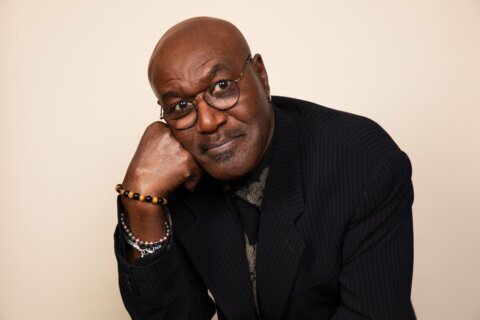John Williams is arguably the greatest film composer ever in the history of movies.
The Kennedy Center is welcoming Williams in person for a series of 90th birthday events all week long, including special movie concerts by the National Symphony Orchestra.
“You’ve never seen the movies quite like this,” Conductor Steven Reineke told WTOP. “There’s a huge HD screen above the orchestra, the movie is projected and we provide the soundtrack live, synchronized, in time, front to back for the entire movie. … They were never created to be done this way! … John Williams scores are my favorite to conduct.”
On Wednesday, Reineke will conduct an NSO screening of “E.T. The Extra-Terrestrial.”
“We’re celebrating the 40th anniversary,” Reineke said. “It’s a fantastic movie. It’s just touching, really heartfelt and the music is spectacular. It really is one of my favorite John Williams scores. A lot of people think of the bike chase and the big exciting music, but most of it is really sensitive, tender music depicting this bond between E.T. and Elliot.”
Which instruments does Williams use to create the iconic “E.T.” score?
“It really uses a lot of the tinkly instruments of the orchestra,” Reineke said. “It uses a lot of piano, a lot of the instrument called the celeste, which is a bell-sounding thing, and there’s a massive amount of harp. There is so much great harp writing and great harp solos in this score. I don’t know of another movie score like it that features the harp so prominently.”
To this day, it remains one of the most immortal children’s movies ever made.
“It’s held up to the test of time,” Reineke said. “It’s about finding connection and finding yourself. … It’s a little bit autobiographical of Spielberg’s upbringing as a child. He also had an imaginary friend and that’s kind of where the idea of E.T. came from, coping with trauma, coping with divorce … and this alien gives Elliot this real sense of purpose.”
On Friday, Reineke will next conduct an NSO screening of “Jurassic Park.”
“We can all remember being in awe watching it, thinking, ‘We’ve never seen anything quite like it.’ It was so realistic, so lifelike,” Reineke said. “It still really holds up. I think part of it is that it’s not all CGI. They created dinosaurs, the triceratops, that’s not a fake animal, they’re actually interacting with puppet animatronics. It feels real and it’s frightening.”
Which instruments does Williams use to create the “Jurassic Park” theme?
“There’s obviously a lot of brass in ‘Jurassic Park,’ those great fanfares, the big main theme … that’s all trumpets and horns and trombones,” Reineke said. “Then the second theme is a little bit more tender with strings and woodwinds. [Reineke starts singing the theme while making up his own lyrics]; ‘I love dinosaurs, great big dinosaurs.'”
Between the individual movie concerts, Thursday brings a birthday gala conducted by Stéphane Denève with guests Steven Spielberg, Yo-Yo Ma and Anne-Sophie Mutter. If you’re bummed that it’s sold out, you can still see Williams before “Jurassic Park.”
The movie starts at 8 p.m. but at 7 p.m., John Williams will do a question-and-answer session on stage, “so people should come early and listen to John,” Reineke said.
Reineke can’t wait to ask Williams a few questions of his own.
“I’ve never met him and he’s one of my musical idols, so I’m kind of freaking out,” Reineke said. “I’m going to ask if he’ll sign something for me. … His first album when he was 24 or 25 is called ‘The John Towner Touch,’ his middle name is Towner. … I scoured the Internet and found a copy of this album from Japan … and I’m going to surprise John with it.”
Listen to our full conversation here.








